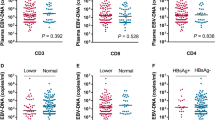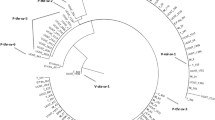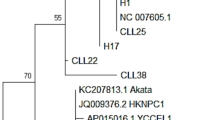Background and Purpose:
Nasopharyngeal carcinoma (NPC) represents a seldom malignancy in most developed countries. Nevertheless, NPC receives an endemic form in concrete racial entities. The aims of this study were to detect the presence of Epstein-Barr virus DNA (EBV-DNA) in peripheral blood of NPC patients, to molecularly define human leukocyte antigens (HLA) DRB1*, DQA1* and DQB1* allele frequencies, and, finally, to determine whether the genetic predisposition of an individual to NPC depends on the liability to EBV infection.
Patients and Methods:
A total of 101 patients of Hellenic origin and nationality, with histologically proven NPC, participated in this study. EBV-DNA detection was also applied in 66 patients with EBV-related malignancies (Hodgkin's [HL] and non-Hodgkin's lymphoma [NHL]) and infectious mononucleosis (IM), as well as in 80 healthy EBV-seropositive controls.
Results:
81% of the NPC patients, 77.8% with HL, 72.2% with NHL, and 66.7% with IM were EBV-DNA positive, whereas the EBV genome was detected only in 15% of the healthy controls. These differences were statistically significant in all cases. Analysis of HLA class II antigens showed decreased frequency of the DRB1*07 (p = 0.003), DQA1*0103 (p = 0.002), and DQA1*0201 (p = 0.003) alleles among NPC patients. A significant association between the HLA-DR/DQ alleles and the presence of EBV-DNA in peripheral whole blood was not established.
Conclusion:
Circulating EBV-DNA and specific HLA class II alleles may predispose to or protect from NPC. However, the results of this study suggest that the genetic predisposition of an individual to NPC is independent of the liability to EBV infection.
Hintergrund und Ziel:
Das Nasopharynxkarzinom (NPC) ist in entwickelten Industrieländern ein relativ seltenes Malignom, nimmt jedoch in bestimmten Regionen und ethnischen Entitäten endemische Formen an. Ziele dieser Studie waren der Nachweis von Epstein-Barr-Virus-DNA (EBV-DNA) im peripheren Blut von NPC-Patienten, die molekulare Allelfrequenzverifizierung der assoziierten humanen Leukozytenantigene (HLA) DRB1*, DQA1* und DQB1* sowie die Evaluierung einer individuellen genetischen Disposition für NPC in Abhängigkeit von der Wahrscheinlichkeit einer EBV-Infektion.
Patienten und Methodik:
Insgesamt nahmen 101 Patienten griechischer Herkunft und Nationalität mit histologisch gesichertem NPC an dieser Studie teil.
Ergebnisse:
Ein EBV-DNA-Nachweis gelang bei 66 Patienten mit klinisch manifesten EBV-assoziierten Malignomen wie Hodgkin-Lymphom (HL), Non-Hodgkin-Lymphom (NHL) und infektiöser Mononukleose (IM) wie auch bei 80 klinisch gesunden, serologisch positiven Individuen. Im Speziellen waren 81% der NPC-, 77,8% der HL-, 72,2% der NHL- und 66,7% der IM-Patienten EBV-DNA-positiv, wohingegen nur bei 15% der klinisch gesunden Individuen eine analoge Genomdetektion gelang. Die assoziierte HLA-Klasse-II-Antigen-Analyse zeigte sowohl eine abnehmende Allelfrequenz für DRB1*07 (p = 0,003), DQA1*0103 (p = 0,002) und DQA1*0201 (p = 0,003) unter den NPC-Patienten als auch das Fehlen eines signifikanten Zusammenhangs zwischen HLA-DR/DQAllelen und dem Nachweis von EBV-DNA im peripheren Vollblut.
Schlussfolgerung:
Zirkulierende EBV-DNA und spezifische HLA-Klasse-II-Allele können prädisponierend oder protektiv für NPC wirken. Die eigenen Ergebnisse zeigen, dass die individuelle genetische Disposition, an NPC zu erkranken, unabhängig von der Wahrscheinlichkeit einer EBV-Infektion zu werten ist.
Similar content being viewed by others
Author information
Authors and Affiliations
Corresponding author
Rights and permissions
About this article
Cite this article
Karanikiotis, C., Daniilidis, M., Karyotis, N. et al. HLA Class II Alleles and the Presence of Circulating Epstein-Barr Virus DNA in Greek Patients with Nasopharyngeal Carcinoma. Strahlenther Onkol 184, 325–331 (2008). https://doi.org/10.1007/s00066-008-1816-4
Received:
Accepted:
Issue Date:
DOI: https://doi.org/10.1007/s00066-008-1816-4




